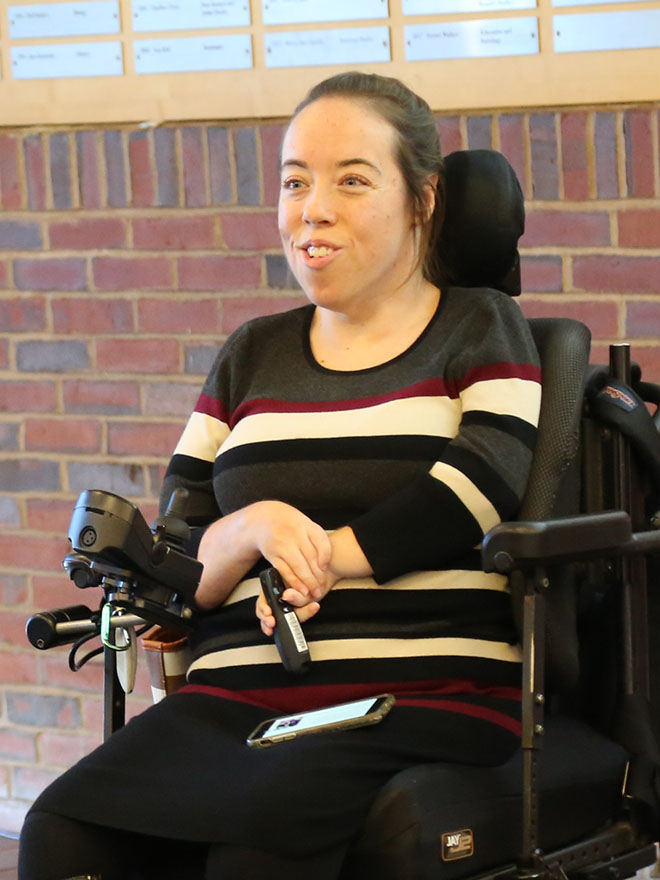By Karen Shih

How is the COVID-19 pandemic affecting people with disabilities?
When it became obvious that COVID-19 was taking over our society, I started to worry a lot about people with disabilities. I heard so much about older people and how it would affect them. But I never heard anything about people with disabilities. I thought that was a significant oversight because people with disabilities tend to have preexisting conditions that make us more vulnerable. Not that we’re more likely to get it, but that we’d get it worse.
Personally, I am essentially self-isolating, but I can’t do so completely. I have people who come to the house every day [for home care services]. It wasn’t clear how that would be affected by the lockdown—would they be able to come? Now, I worry about being exposed because I can’t control where they go when they aren’t at my house.
Health care rationing is one of the biggest issues. Who gets ventilators if we don’t have enough? There’s a significant bias against people with disabilities—our lives are undervalued. States like Alabama and Tennessee specifically included certain disability types in their crisis standard of care. Basically, if we become unable to treat all people, these are the people who won’t be treated: people with severe intellectual disabilities, or people with certain types of muscular dystrophy. In other states, it’s less blatant but still problematic. In Massachusetts, the original plan talked about a person’s longevity and lifespan. But for people with disabilities, they may be told they only have a short time to live, and they live well past that. Hospitals need to realize their legal mandates under the Americans with Disabilities Act. They can’t discriminate or base decisions on stereotypes—they must create individualized treatment.
In addition, the overall messaging around the virus has been hugely inaccessible. The White House never has a sign language interpreter, and their social media never has videos captioned. The CDC information is at a very high level, which is not accessible to people with low literacy.
What are some policy changes you hope will come out of this pandemic?
One of the things that’s been really fascinating to me is the issue of reasonable accommodation. People with disabilities have been told for years we can’t work from home, or attend classes via Zoom. But now everyone’s doing it. I’m hoping as we go back to normal, we can apply some of those lessons.
For health care rationing, advocates have filed complaints with the federal government, and there have been positive changes. As we plan for future crises, people with disabilities need to be included in the emergency planning process at the local, state and federal levels. We need to be in the room with the doctors and bioethicists as they’re making decisions about crisis standards of care.
I look at the people protesting stay-at-home orders, talking about the economy over lives, the strong over the weak. What is that saying? People with disabilities and people who are vulnerable are less important? We aren’t productive members of the economy? That excludes a large population. We need a societal shift that’s policy-based, program-based.
How are you and your colleagues at the Lurie Institute addressing the pandemic right now?
I’ve written pieces for mainstream media outlets [such as the Appeal] to bring the topic into mainstream conversation. I’m active on social media. I engage with disability advocates and elevate the voices of people with disabilities as they share their stories. I don’t focus on disability groups and outlets because I don’t want to preach to the choir. I need the choir to become the world.
I’m part of the National Research Center for Parents with Disabilities, and we hosted a Twitter chat for disabled parents. It was an opportunity for them to share their concerns with each other and with us. For many of them, there was a great fear of what would happen if they got COVID-19 and had to go to the hospital, where their lives would be devalued. They worried about what would happen to their children.
My colleague Finn Gardiner also created this great plain-language information sheet about COVID-19 for people with low literacy and intellectual disabilities, which is fantastic.
What type of research do you plan to do about the COVID-19 pandemic?
My work at Lurie focuses on health care access, specifically reproductive healthcare, and parents with disabilities. So two areas I’d like to study are health care rationing, looking at how bioethics and disability rights clash in a lot of ways, as well as how the pandemic is affecting parents with disabilities who have children in the child welfare system. For example, if parents have children in foster care, how has COVID-19 affected their ability to visit their children? There could be virtual visits, but that’s not accessible to everyone. There are mandated timelines around reuniting families and adoption, so what are the consequences of these families being separated?
Any time we can get the conversation to look at the ways in which the virus is elevating inequities is really important. In times of crisis we see that existing inequalities only become more significant.
